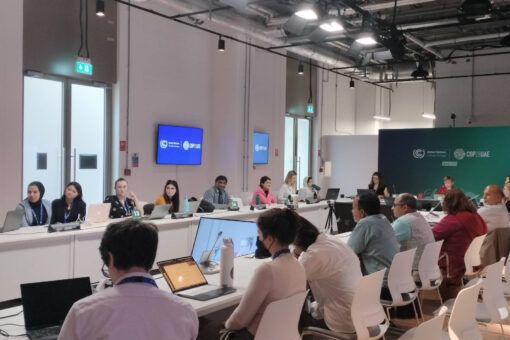
Dubai was an interesting venue for a climate change conference, not only because of the heavy fossil fuel industry influence or that the 28th Conference of the Parties (COP28) president was the head of a major oil company but also because you can feel global heating. It was winter in Dubai, but it was terribly hot. The winter heat was, however, nothing compared with how hot it was in July, which I had the misfortune to experience. COP28 should have been held in Dubai in the summer then world leaders would have felt how unbearable and uncomfortable it is to be outdoors even at midnight.
I attended my first COP without many expectations and much hope. The venue was massive. I spent my first two days exploring the green zone (the part which is open to the public), which often felt more like the greenwashing zone: the words sustainable, net zero, and climate resilience were dropped into odd contexts without rationale. For instance, there was a Red Crescent hub which explained how they are improving refugee health through providing emergency healthcare service provision, but how, I wondered, are they ensuring sustainability? When I asked, I found that they equated saving lives with sustainability, which did not make sense to me.
I was very pleased to be able to have lunch with Dr Maria Neira, the WHO director of the Public Health, Environment and Social Determinants of Health Department. Neira is effectively the global leader on the climate and nature crisis and health, and I’m an admirer of her work. It was insightful to learn about the health and COP insights from a WHO perspective, especially after many years of hard work from the global health community resulted in a successful first health day at COP28. But of course, still a long way to go.
The blue zone (the part of the COP which is invite only) seemed to be even more chaotic than the green zone with so much happening that it was difficult to keep up. I thought my observer badge would let me observe everything, but I was not allowed into the ministerial plenary session discussing how the Kumning-Montreal Biodiversity Framework (GBF), which was adopted at the biodiversity COP15, would be implemented. The GBF has 23 targets for 2030 and 4 targets for 2050 to reach the global vision of a world living in harmony with nature.
Instead, I went to the panel discussion next door on sustainable ocean management. The panel repeated familiar arguments: that small island nations need better climate financing to adapt to the climate crisis; and fossil fuels must be phased out, especially by the global north. I hope the minister from Norway who was in the room noted and will act on these demands.
From there on I headed to the WHO health pavilion where mitigation of methane from food systems was being discussed. The messages were the same as those made by UKHACC that we need to transition towards plant-based diets with a reduction of meat and dairy for better health and environmental benefits. An hour later I attended an event on food system financing where the discussion was about how future investments should be towards technologies that could reduce methane from farm animals. Health didn’t feature in these discussions. These technologies are the equivalent of carbon capture in the animal agriculture world and would not reduce the adverse health impacts of burning fossil fuels or consuming red and processed meat. This panel illustrated for me why we need to persistently advocate for a “Health In All Policies” approach.
I learnt at COP28 about party outreach, a process that allows engagement with ministers or officials from different countries. As it was my first time I was keen to learn and I observed strong advocacy from our tiny team of health professionals in the Iceland and Germany pavilions. I would also like to think that our advocacy had a tiny role in influencing the Iceland delegation to sign the health and climate declaration, which they had not until then.
Overall, COP28 has been a compromise. There was marginal success in the first health day and the signing of the health and climate declaration by over 140 nations and the first Global Stocktake (which is a comprehensive evaluation of progress since the Paris Agreement) mentioning transitioning away from fossil fuel. But the lack of clarity leaves many loopholes. Reaching net zero without phasing out fossil fuels and using carbon capture technologies has minimal health benefits. Waiting another year to debate yet again about phasing out fossil fuels in another oil-rich nation, Azerbaijan, is simply unacceptable. The world has heated to 1.4 degrees C and 2023 was the hottest year on record. Vulnerable nations and communities are bearing the consequences now and will continue to do so unless we stop new fossil fuels and transition to clean energy. This has been a central ask from the health community and we will continue demanding it. The Earth is the only home we have, and we cannot continue to watch it being destroyed. The science is clear: no fossil fuels.
That said, I am grateful to have attended COP28 as it was motivating and energising to meet brilliant people from around the world who are doing great work to preserve the climate and nature. Would I attend again if the opportunity arises? Most definitely yes. Why? Because I believe that the health voice is ultimately going to convince world leaders to act because the climate emergency is a health emergency.
